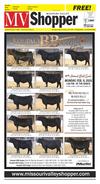032420_YKMV_A7.pdf










March 24, 2020 • Page 7
shop online at www.missourivalleyshopper.com
Salute to
Agriculture
The Role of
Tech in Agriculture
Modern industry is driven by technology.
Advancements in technology have changed how
business is conducted, with some industries undergoing
dramatic changes since the dawn of the 21st century.
While agriculture might not be the first industry
people think of when reflecting on the changing nature of
industry, The National Institute of Food and Agriculture
notes that modern farms are vastly different than those
from a few decades ago.
Farmers have long relied on technology to make
their operations as efficient, productive and profitable
as possible. Precision agriculture, which refers to
technological advances designed to propel agriculture
into the modern, computerized and information-based
world, is helping the agricultural sector become more
profitable and efficient while also improving safety
and making agriculture more eco-friendly. In addition,
the NIFA notes that the modern agricultural industry
employs technology such as robots, temperature and
moisture sensors, aerial images, and global positioning
systems.
If it sounds complicated, that’s because it is. For
example, modern sensors can detect soil conditions,
potentially producing hundreds of readings per second.
These sensors help farmers know the best possible time
to plant seeds so they can reach their full potential. That
improves both the efficiency of modern farms as well as
their output.
The NIFA also notes that agricultural technology
has reduced waste. For instance, thanks to agricultural
Family Farms
technology, farmers no longer have to apply water,
fertilizers and pesticides uniformly across entire fields.
Technology has shown that farmers can simply target
specific areas or even treat individual plants differently.
That saves time and allows farmers to use only minimal
quantities of water, fertilizer and pesticides. In addition,
according to the NIFA, employing agricultural technology
in this fashion leads to higher crop productivity and
reduces runoff of chemicals into rivers and groundwater,
thereby reducing the farm’s impact on local ecosystems.
Modern farms are technological marvels where
various technologies are being employed to produce
crops more efficiently and safely than ever before.
?MetroCreativeConnection
Beef is a Nutrition Powerhouse
Lean beef is a nutrition powerhouse. It is a
naturally nutrient-rich
food providing 10 essential
nutrients with only about
150 calories per 3-ounce
serving. Lean beef packs
more nutrients per bite
with fewer calories, so
it’s easier on the waistline
than empty-calorie foods.
Meeting the new 20152020 Dietary Guidelines
and MyPlate recommendations, lean beef is a great
addition to a plate full
of fruits, vegetables and
whole grains.
Here are just a few of
the many “hidden” nutrients in lean beef, along
with the multiple body
benefits they provide:
Protein: A 3-ounce
serving of beef provides
25 grams of protein which
is about 50% of your
recommended Daily Value
(DV). It plays a major role
in muscle maintenance,
weight management and
prevention of chronic
diseases.
Selenium: As an excellent source of selenium,
one 3-ounce serving of
beef provides 40 percent
of your daily needs. It
provides antioxidant benefits, as well as enhancing
the body’s ability to fight
infections.
Choline: As an essential nutrient for humans,
choline plays a vital role
in cognition and long- and
short-term memory functions. Beef provides 16 percent of the DV for choline.
Zinc: Beef provides
36 percent of the DV for
zinc. Zinc is essential for
proper growth and health
and also plays a key role
in building muscles and
healing wounds.
Iron: Iron helps carry
oxygen in the blood to
all cells and muscles to
prevent fatigue. To get the
same amount of iron in a
3-ounce serving of beef,
you would need to eat an
equivalent of three cups of
raw spinach!
Vitamin B12: Essential for proper brain and
nervous system function, vitamin B12 is only
naturally available from
We Proudly Support
National Agriculture Week
and National Ag Day!
animal foods. Beef is an
excellent source, providing
44 percent of the DV.
Besides tasting great,
you can feel good about
loving beef. Lean beef
provides a simple and
delicious way to meet the
daily recommendations of
several nutrients. It gives
you the power to feel full
longer, stay active longer
and manage your weight.
It’s a great feeling to know
that the food you crave is
good for you too.
For more information
and beef recipes, check
out the South Dakota
Beef Council. In addition,
see UNL Extension’s Easy
Ground Beef Recipes
From Your Freezer for
quick, healthy meals in a
hurry.
• 98% of farms in South Dakota are family owned and
operated – in fact, over 2,500 South Dakota farms
have been in the same family for more than 100
years.
• The average size of a farm in South Dakota is 1,374
acres.
• The average age of a South Dakota farmer is 55.7
years.
• There are 46,000 producers in South Dakota on
31,800 farms.
• Each year, one South Dakota producer raises
enough food to feed 155 people in the U.S. and
abroad.
• South Dakota producers are first in the nation in
planting genetically engineered varieties of corn
(95%) and soybeans (98%).
• There are 15 ethanol plants operating in the state
and they produce more than 1 billion gallons per
year, which is 10% of the nation’s ethanol supply.
• South Dakota wineries have produced over 2.3 million bottles of wine since 1997.
*Data courtesy of USDA NASS, SD Corn, USDA NRCS, SDSU, SD DOR and SDDA.
Facts about Raising Beef
• Average age of a beef cattle rancher is 58
• Of the 727,906 beef farms and ranches, 91% are
family-owned or individually-operated
• 11% are operated by women
• The average beef cow herd size is 40 head of cattle
• There’s a app for that! Modern-day ranchers use
all kinds of technology from drones to apps to help
maintain a healthy herd.
We Support Our Farmers!
Beef cattle production
is the single largest segment
of American Agriculture
HOXENG CROP INSURANCE LLC
For Your Crop Insurance Needs
Beef. It’s What’s For Dinner.
1000 Cattle Dr., Yankton • 605-661-1665
MPCI & Crop Hail
38 Years Of Crop Insurance Experience
Dave Hoxeng
44867 303rd St., Volin, SD 57072
Office: 605-267-2767 Cell: 605-661-1136
Tyler Hoxeng Cell: 605-661-7241
We Are An Equal Opportunity Employer
Farm Equipment Repair Service
Proud To Serve Our Local Farmers!
Now Offering Pick Up & Delivery
Schuurmans Farm Supply
Cuka Truck
Repair
Ag &
Residential • Commercial • Lawn Equipment
Matthew Cuka, Mechanic
29675 427th Ave., Scotland, SD 57059 • cuka454@yahoo.com
Cell (605)464-0096 • (605)583-2301 • (605)583-2516
Merkel Electric, Inc
dba Johnson Electric
We salute the dedicated men and
women of agriculture for all that
they bring to the table!
5 miles west of Tyndall on Hwy. 50, Corner of Hwys. 50 & 37
(605)589-3909 • www.schuurmansfarmsupply.com
Rick Merkel • Ben Merkel • Chris Merkel
Providing farmers
with customized seed
solutions to best meet
their needs in quality,
reliability and overall
field performance.
• Rural • Residential • Commercial
• Electrical & Telephone Wiring
•We Trench H20 Lines, Footing & Electric Lines
•Our Bucket Truck Reaches 80’ PLUS
•We Set Poles
Fast Courteous Service
500 W. 12th,
Yankton
665-5686
Your
Scott Nedved
Seedsmen
Frank Nedved
605-660-5353 • www.n2seed.com

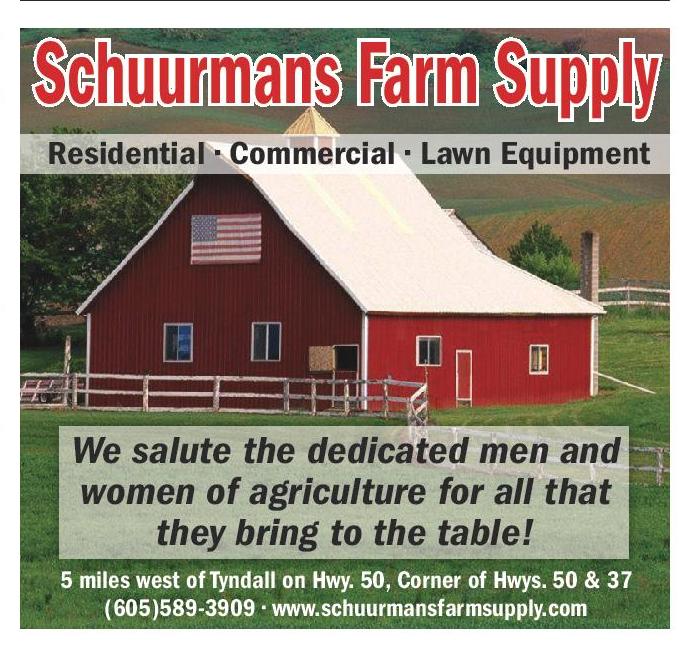

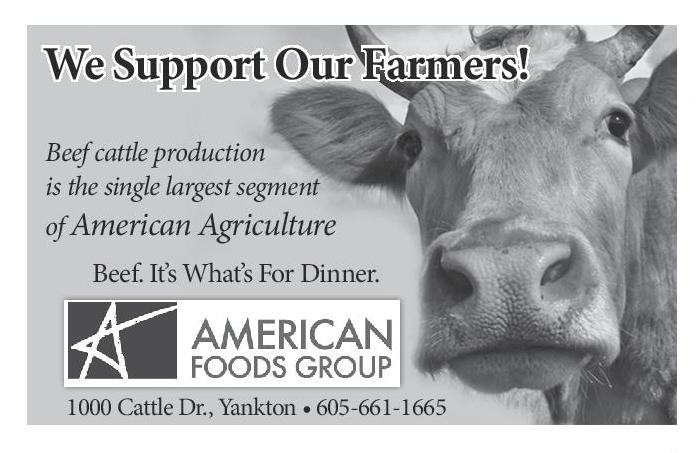



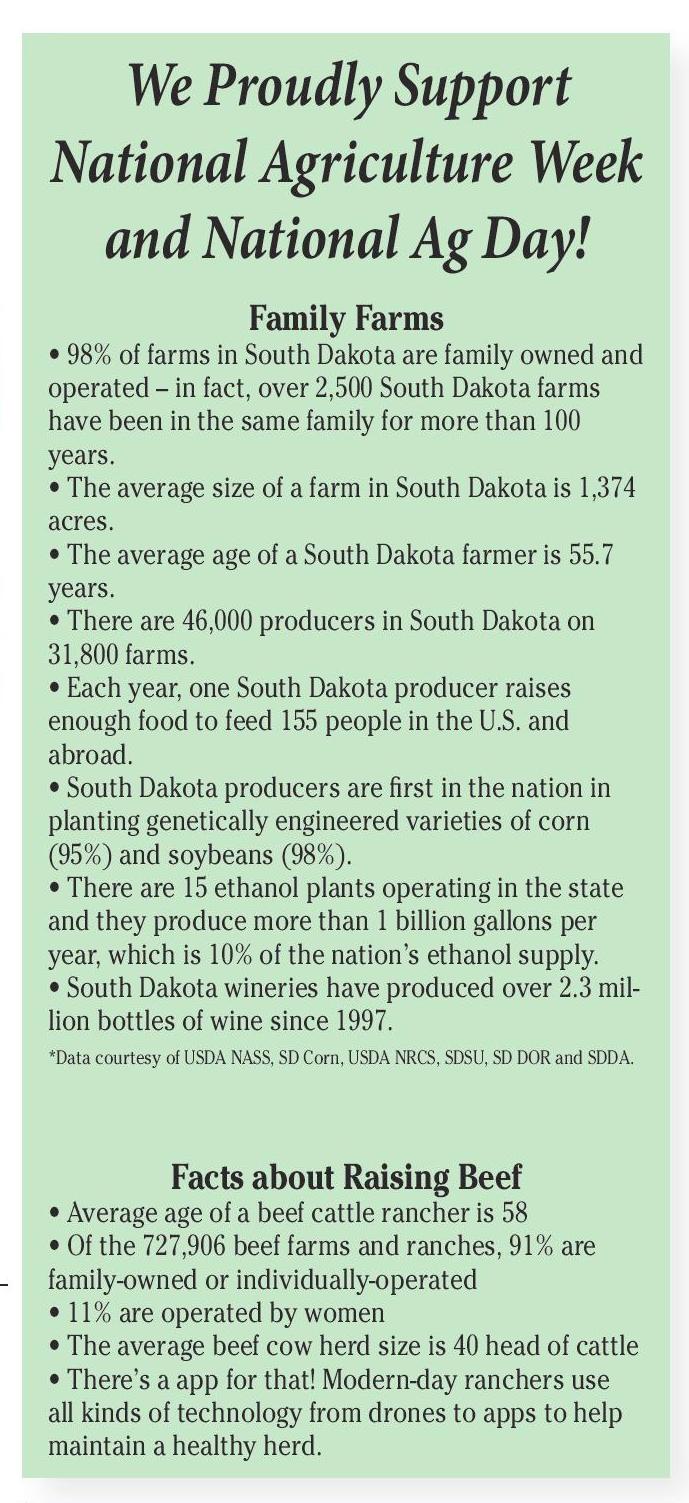
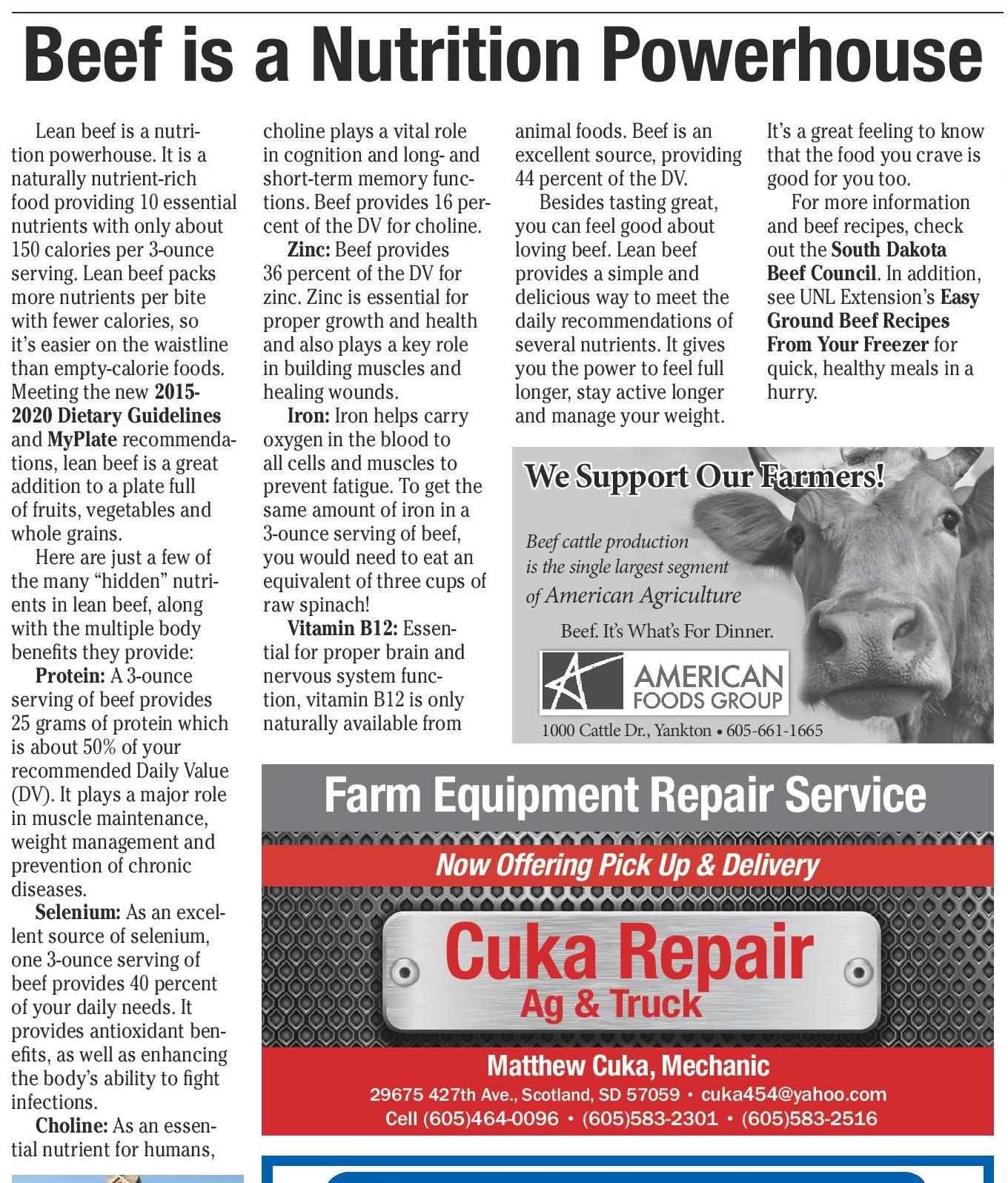








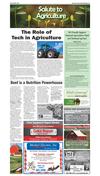

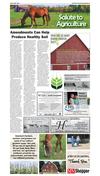



 Previous Page
Previous Page



